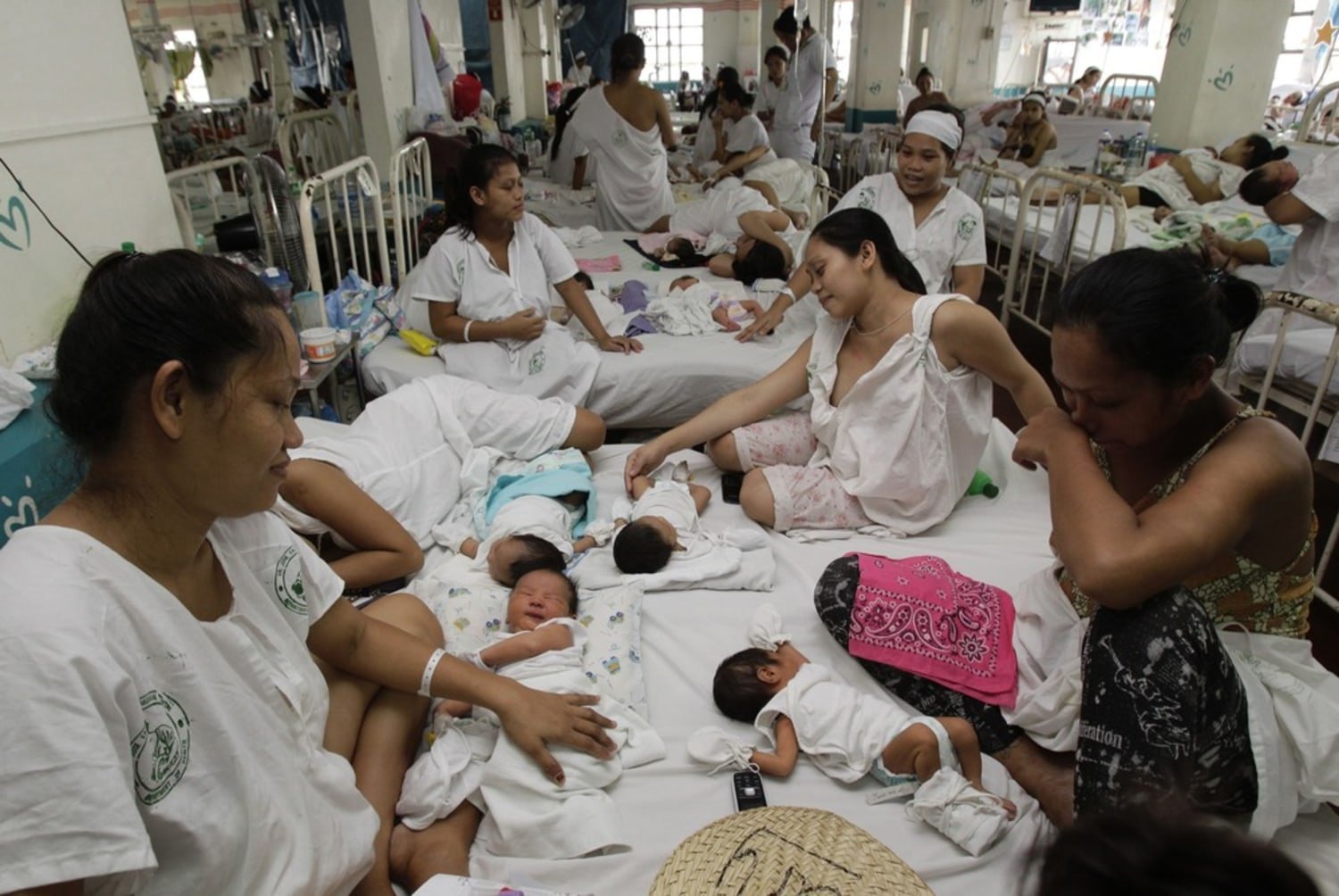A wall separates residents of Baseco from Manila Bay, a natural port in the heart of the Philippine capital. More than 64,000 people live in the densely populated complex, with houses made of concrete blocks and waste materials, covered by canvas-reinforced, undulating cardboard ceilings, making them prone to flooding.
Among the residents is Clara, 14, who lives on the outskirts of the informal settlement. Wearing an extra-large black T-shirt with graffiti, his little figure subtly reveals his belly. Pregnant for six months, the young mother-to-be longs to have a child. I want him to be like my big brother. “I don’t want it to end like me,” he tells CNN.
Clara comments that in school, sex education was not taught in our class… we had different subjects in science class. If she had known more about reproductive health, Clara believes she would have avoided getting pregnant so young.
Clara is one of many girls, more and more, between 10 and 14 years old, who have become pregnant in early adolescence. Stories like yours are at the center of intense debate among lawmakers, health experts, and religious groups about what the future of sex education should look like in this deeply Catholic country.
CNN spoke to several Filipino girls and young women between the ages of 14 and 23, including mothers, who said they had not received sex education at school or, if they had received it, lacked useful information about consent or contraception. One of the women, Sam, 23, remembers learning about birth control in an eighth-grade class, with a warning not to use them.
Dr. Aileen Marie Rubio, Dr. Hospital. José Fabella Memorial in Manila said that most of the teenage girls have a very limited knowledge of reproductive health, consent, and what is considered abuse. Rubio, who works at the hospital clinic with a focus on teenage mothers, explained that most young women were unaware that they could get pregnant if they had sex.
Clara met her boyfriend through friends and became pregnant just six months after the relationship began. Although she is expected to give birth within three months, she has not attended any prenatal screenings and knows little about the baby’s health. I still don’t have the money to go to the hospital.
However, experts say mothers so young face much higher health risks during pregnancy and childbirth, as do their babies.
A national social emergency.
In the Philippines, childhood and adolescent pregnancies are among the highest in Asia. While there has been a slight decrease in pregnancies among young people aged 15 to 19, there is now a marked increase in pregnancies among girls aged 14 and under, increasing by 38 per cent, from 2,411 in 2019 to 3,343 in 2023.
Government agencies have long declared teenage pregnancy a national social emergency, and in 2022, legislators presented the first draft of a law on the prevention of teenage pregnancy, aimed at addressing the problem.
Three years later, the bill is on its legal course, following multiple amendments and the latest new submission last month, following fierce opposition from conservative organizations and religious groups.
The bill seeks to standardize comprehensive Sex Education (CSE) in schools and improve access to sexual health services. Currently, adolescents under the age of 18 need the consent of their parents to access contraceptives, with some exceptions.
“Like it or not, according to the data, there are sexually active teenagers now,” Senator Risa Hontiveros, the bill’s lead author, said in a statement earlier this year. He added that the bill is necessary to empower teenagers.

But an earlier version of the bill faced fierce opposition from church groups across the state, which is deeply Catholic. The Catholic Church believes that sexual intercourse should only be between married couples and teaches abstinence to the rest of the people. The Church also disapproves of artificial contraception, but allows natural methods to prevent pregnancy within marriage. Abortion is illegal in all circumstances in the Philippines, including after rape or incest.
The opposition recently culminated in a joint lobbying initiative by a coalition of at least eight evangelical and Catholic organizations across the country, known as Project Dalisay.
The Dalisay/Pure Project, which began as an initiative of the National Coalition for the Family and the Constitution, interprets the bill as a fighter against its ideologies about sex and parental authority, and its main point of discord revolves around child sex education.
The project coordinator, María Lourdes Sereno, former president of the Supreme Court of the Philippines, told CNN that the CSE intends to normalize conversations about sex, which is not part of Philippine culture. The initiative emerged as a voluntary group of believers, mainly from the evangelical and Catholic communities, to express the objections of parents, mainly to the Senate bill.

Inspired the United States
In early January, the Dalisay Project launched a website that included a petition against the bill and an explanatory video entitled “Unmasking the dangers of CSE.”
The website pointed to 15 harmful effects of the CSE, extracted from resources from the American anti-abortion organization Family Watch International (FWI). These included the eroticization of the use of the condom and the promotion of gender confusion.
FWI told CNN that its research on CSE programs on several continents had found them “inappropriate for age, scientifically and medically inaccurate… and ineffective in preventing teenage pregnancy.”
Dr. René Bullecer, national director of Human Life International (HLI) in the Philippines – another U.S.-based anti-abortion group – has openly supported the Dalisay Project. HLI president Father Shenan J. Boquet also denounced the bill, saying it posed a significant threat to the social, moral, and spiritual foundations of the Philippines, in a lengthy statement to CNN. He added that parents – they have the most direct responsibility to their children – and that the State should help them, not usurp them.
Seeno, of Project Dalisay, told CNN that he has received advice from these U.S. groups, but denied any financial ties. “We look for information, technical and scientific information, in the United States,” he said.
Anti-CSE content became the basis of what critics described as a “deceitful” campaign, in which the Dalisay Project claimed that the implementation of the ESC according to international standards would include inappropriate concepts, something that the Hontiveros senator refuted.
When asked about Project Dalisay’s controversial claims about the bill, Sereno told CNN that she was not inventing anything.
Members of the Dalisay Project also participated in public hearings where the law was discussed to try to influence public opinion.
In late January, several senators who had previously supported the bill withdrew their support, and President Ferdinand Marcos Jr., who at the time publicly supported it, vowed to veto it in its current form.
In response to the “strong reaction,” Jaye Bekema, legislative director of Senator Hontiveros, told CNN that amendments were made. These included the deletion of the phrase -guided by international standards – and the addition of a line that guarantees parental authority or academic and religious freedom. Mentions of abortion and contraception were also removed.
The latest version of the bill, reintroduced last month and will now face several rounds of committee hearings and readings by lawmakers.
From childhood to maternity
Meanwhile, 15-year-old Jude is dealing with her new identity as a young mother. As she told CNN, she learned about sex thanks to her partner, much older than her. She left school at the age of 14, eight months pregnant, and moved in with her boyfriend, who was then 21 and whose family she still lives with. This age difference of 7 years is the average for young mothers, according to a study funded by the U.S. Agency for International Development (USAID).
The Philippine Family Planning Organization (FPOP), a non-profit organization, supports Jude with family planning measures and shares available resources to enable him to continue his studies. According to CNN, the case of Jude highlights a crucial concern regarding consent, power imbalance, and decision-making in youth relations.
Pregnancy in girls under 16 is also three times more risky than in older women, explains the doctor. Junice Melgar, executive director of Likhaan, a non-governmental organization in the Philippines.
The girls are not physically or mentally prepared to gestate babies and do not seek medical attention if they become pregnant, Melgar says. And, especially if there is a high degree of stigma, they are not encouraged to seek medical care.
According to the World Health Organization, mothers and adolescents face an increased risk of eclampsia (convulsions), postpartum endometritis (inflammation of the uterine lining due to an infection after childbirth), and systemic infections than women aged 20 to 24. Babies of teenage mothers also face an increased risk of low birth weight, premature birth delivery and severe neonatal conditions.
NGOs like Likhaan are working to narrow the gap in sexual and reproductive health services by visiting the communities that they say most need them.
CNN followed its team of young volunteers in deprived areas of Malabon, a city near Manila, where children play on the streets and teenagers roam near grocery stores.
Received with open arms from the community, volunteers talk to young people about gender and relationships. They also approach parents and give them leaflets on how to talk to their children about sex.
Volunteers head to a community basketball court, where young men meet, and hand out a safe sex kit that includes condoms.
For girls like Clara, these materials could have changed their lives, allowing them to continue their studies and resume their childhood. I feel sad. “I want to go to school,” he told CNN. Even if I could go, he admits he might be ashamed.
Clara hopes to give birth in the hospital and says that, so far, the only support she has received has been that of her mother. The imminence of childbirth scares her. “Many told me it was going to be painful,” he confesses.
She still hopes to finish school one d, ay and her son has better opportunities than she. That’s it, he concludes.
All the names of minors have been changed at their request to protect their identity.













